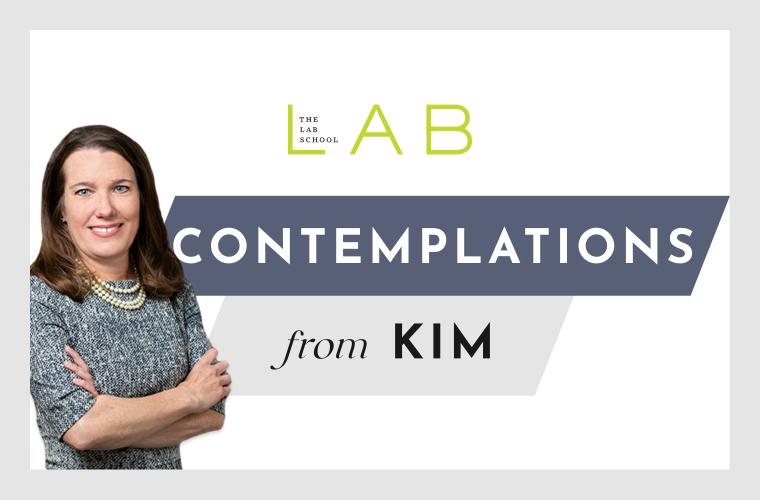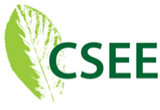Contemplations from Kim: Advice from the Experts
By Kim Wargo, Head of School

Click here to listen to an audio recording of this month's column.
Advice from the Experts
While we know we’ll see a few of our local young alumni at Friday’s Homecoming basketball games, it’s really been Homecoming for several weeks at Lab.
Right after the Winter Break, we invited our young alumni from the classes of 2018, 2019, 2020, 2021, and 2022 to an afternoon gathering to see former classmates and teachers. It was a fantastic turn-out and I loved meeting so many Lab alumni who are navigating their post-Lab lives with aplomb.
After the informal gathering in the Sands Forum, we moved to the Shaun Miskell Theater, where our Upper School students and 8th graders were treated to a panel discussion on “Life After Lab,” featuring six of our college-aged alumni: Belen Riberas ’19 (Notre Dame), Riley Moran ’20 (UNC-Chapel Hill), Reese Baldwin ’21 (American University), Emry Goldstein ’22 (Cleveland Institute of Art), Logan Johns ’22 (Howard University), and Alex Soto ’22 (Northeastern University).
You can view the full video of the Q & A, moderated by Upper School Head Lisa McMahon and a truly worthwhile investment of 45 minutes, HERE.
However, I wanted to share a few of the nuggets of wisdom we heard from our young alums. You will hear straight from the experts in the field the ways their Lab experience has helped prepare them to navigate their college lives.

How did Lab prepare you for college?
Belen: “Lab always expected more of me. I had close relationships with my teachers. In college, it’s not as easy to approach your teachers. But the confidence that Lab gives you to reach out and ask for help – take advantage of it! Don’t take it for granted.”
Alex: “Self-advocating. As I’ve gotten older, I’ve seen the benefits of being able to self-advocate!”
Belen: “Seniors, take your senior thesis seriously. It prepares you for the kind of work you will do in college.”
(This comment was followed by thunderous applause from the teachers in the audience!)
Are there ways you wish you had been better prepared for college?
Riley: “The classroom environment in college is very different. The pace is quicker, and classes are larger. It can be a shock and somewhat intimidating. Lab can’t teach you what it’s like to sit in class with 200 people all vying for the professor’s attention. My advice is take a summer class or a community college class during high school – it will help you feel prepared.”
Reese: “Take advantage of your 11th grade internship. To this day, it’s one of the most useful things on my resume.”
Emry: “Waking up by yourself! Don’t be late to class….”
Were there aspects of your high school experience that guided you in choosing your school or your major?
Logan: “With these teachers around you, you are set up for success. You are set up for life. In History of People of Color of America, I learned how to talk about things that are really hard to talk about.”
Riley: “Take advantage of the junior internship program here. You have no idea the impact it will have on your life in college and beyond. It solidified my passion for nature, for research, and for an academic career hopefully one day. I’m currently engaged in research that started with my junior internship. Work in microplastics that I did in high school is what I’m engaged in today.”
Can you share your best strategy for studying for cumulative exams?
Emry: “Break tasks into smaller chunks. The big task is overwhelming. With 10 tasks, you can check them off one by one.”
Belen: “This is just me, but I don’t study in the library. I don’t go to the library because it turns into a very social atmosphere. I get distracted by everything. I need a quiet space – like the ones you have here at Lab.
Alex: “Study ahead of time. So you don’t have to cram everything in, do 20 or 30 minutes a day.”
Belen: “I annotate everything. (LOUD TEACHER APPLAUSE). I do a lot of office hours – I ask all of my questions. I use the special services for students with LDs. I switch subjects a lot while studying.”
What accommodations or supports do you use at your school?
Alex: “Extended time. My professors are great about it.”
Riley: “All the accommodations that each of you will use are different. I use extended time for math and science. You might find that some accommodations aren’t necessary, OR that things you didn’t need before, you might now find helpful.”
Reese: “It’s important to consider what the support systems look like where you’re going. Your learning differences are a part of you that doesn’t go away.”
Reese: “ Self-advocacy is very important. A professor asked me, ‘Do you really need extended time?’ and I was like yeah, I’m not going to talk to you about that. I went straight to the academic support office. Be informed. Ask what the college has for you, not what you have for the college.”
Any other advice?
Belen: “It’s hard to make friends in college. I’m not going to sugarcoat it. But it’s hard for everyone around you. Find the place you feel most comfortable – people you have things in common with. It’s very necessary to be ok in college.”
And one of our 8th graders closed out our time with our alumni by asking if our panelists could share why Lab’s Upper School was good for them?
Logan: “The people around you. I made friend’s for life in Lab’s high school. The teachers – they will help you with what you need.”
Emry: “Lab helps you advocate for yourself. I feel better prepared for college than most of the people I go to college with. I am able to ask for what I need.”
Belen: “Lab is what you make of it. If you want to, you can easily pass and be satisfied. But if you want challenge, you can get it. You are not at any disadvantage from anyone else. Lab will facilitate the experience that you want to have.”

Watch the full Q & A presentation HERE.


